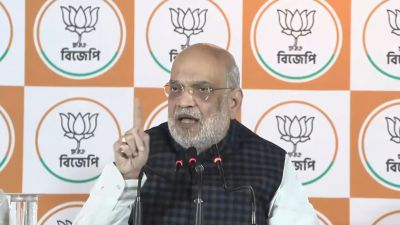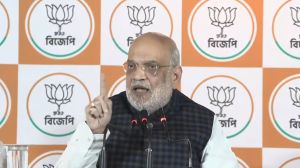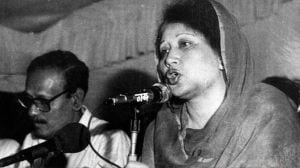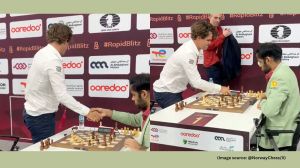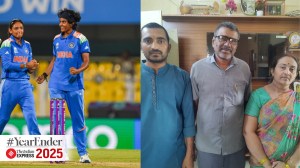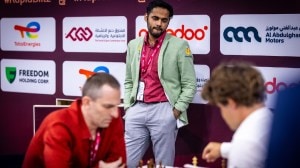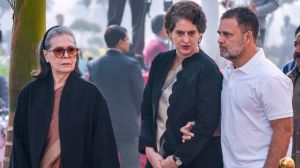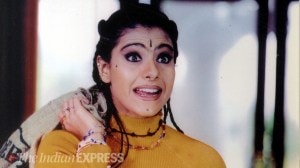Up,close8230; amp; then some
Haadh ho gayi. This dawn of a new millennium' phrase is becoming a bore. It has been done to death by anyone who has anything to peddle. ...

Haadh ho gayi. This dawn of a new millennium8217; phrase is becoming a bore. It has been done to death by anyone who has anything to peddle. I am foxed by the claim of one diamond-peddling company8217;s advertisement on TV. A deep-voiced gent informs us that we should buy diamonds because a millennium comes once-in-a-lifetime8217;. Hey, do humans live over a 1,000 years? I shall now switch the subject, I have no wish to peddle a column on the same wagon!
Last week, I had the opportunity to attend the Crossword Book Awards for the year 1999. It makes me feel all warm and nice inside to see a business put something back into the same world that it earns off. Crossword has done a fair bit towards promoting the reading habit with their browser-friendly spaces. There were two awards, for original work in English, as well as for fiction translated to English, from any Indian language. An award each, for both author and translator.
The cash attached to the prize is pretty darned decent. A book of excerpts, from each ofthe 10 books nominated for awards, was gifted to guests. Nice touch, Sriram and Anita! Of course, I would love to see loads of other awards in categories like non-fiction, etc. Sriram is reported to have retorted, quot;What, so now I have to give an award to Tarla Dalal for her cook book?quot; He denies saying it! But this is not to belittle the efforts of Crossword. A positive move, it is a shame that so little has been done in this area. Just think, if there was no Booker, Pulitzer, or Commonwealth prize, we would have had little opportunity to be so proud of our Indian writing talent.
No world recognised8217; Vikram Seth, Arundhati Roy, Vikram Chandra, V S Naipaul, Rushdie etc. Does the West have to endorse our talent, before we will do so? Have we no judgement of our own? Later, I had a thoroughly engaging encounter with T M Meeran, nominated author of The Story of a Seaside Village, translated from Tamil by M Vijayalakshmi. I asked him a question about his writing, and prompt came the reply, quot;dry chilly.quot; At myconfused countenance, he explained, patiently, quot;Red chilly? Dry in sun.quot;
Though his grammar and accent suggest a reasonable command over English, it is not so. The rest of the evening was spent either buttonholing various kind souls to translate, or facing verbal challenges. Turns out, he earns his bread trading chilly, writing is his hobby8217; read passion. He is a winner of the National Award and the Sahitya Akademi award. The story is prescribed reading at Kerala and Tamil Nadu universities. It is really about class domination in Tamil Nadu. But the novel reads hilariously.
Meeran is 65 and doesn8217;t look it. Lives in a village that has the last polling booth of India, 15 minutes from Kanya Kumari. Writes in the wee hours, midnight to 5.00 am. He tells of when he wrote his first-hand experiences of a communal riot. It was 1968. A friend read his account and said Meeran had a book on his hands. Meeran states proudly, it was the first book ever on such a subject, even before Bhisham Sahni8217;s Tamas 1973.Thus a writer was born. He says the Muslims of his village are divided. And that he belongs to a section that is poor, oppressed and treated contemptuously by other Urdu-speaking Muslims. The man is disarmingly candid, simple and earthy. Asked about the writers he admired? M Mukundan, writer in Tamil, who won this year8217;s award. International authors or books? He knew none. Well, apart from one essay by Tolstoy, he had read nothing else. Sadly, few translations are available.
Which made me think about the other8217; way around, too. Vikram Chandra, one of the judges on the panel, is off on invitation to Israel for the launch of his book Love amp; Longing in Bombay, a Hebrew translation. The book has been translated into various languages, including Danish and Italian. As are several books by other Indian authors. You may be surprised at the numbers. Yet how many of them have been honoured with Indian language translations? Virtually none. Is there a logical explanation for this omission?
Indo-Anglican writingis steeped in the Indian ethos and experience. Pretty easy to translate, wot? And more people read in Indian languages than English. Ah, I can see the salvo being fired: If they are such good Indians, these writers, why don8217;t they write in the language of Indians?
So let8217;s end this year with writings of a different nature. I picked these up, travelling in Wild West8217; Texas, USA. For when you have butterflies in your tummy: quot;I8217;m as nervous as a broke tail cat in a room full of rocking chairs.quot; For when it is freezing: quot;It8217;s colder than a well digger8217;s ass in January!quot; For when it8217;s sweltering: quot;It8217;s hotter than a sweat band in a fireman8217;s helmet!quot; For those wet days: quot;It8217;s rainin8217; harder than a cow pissin8217; on a flat rock!quot;
Anuradha Tandon is an ad film-maker.
- 01
- 02
- 03
- 04
- 05


